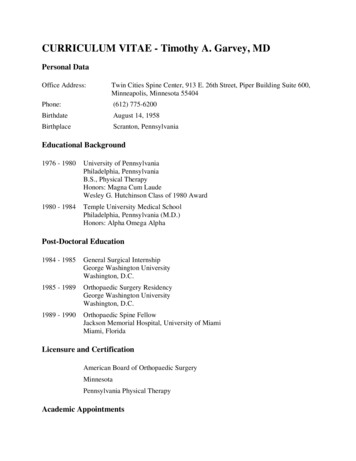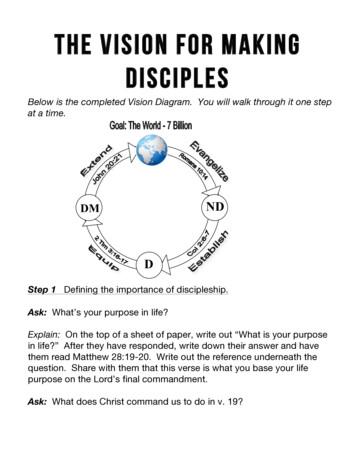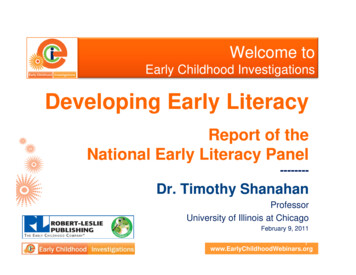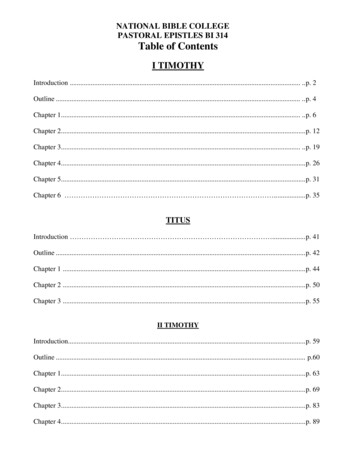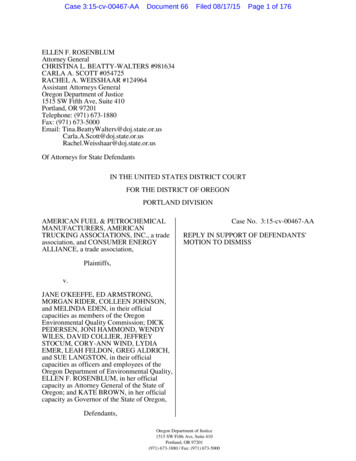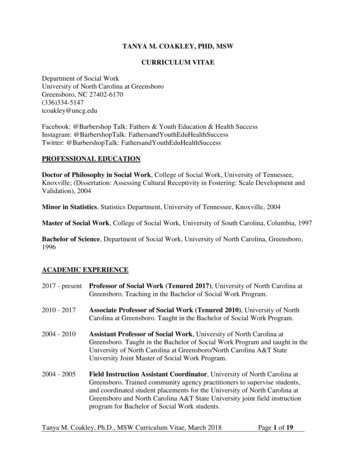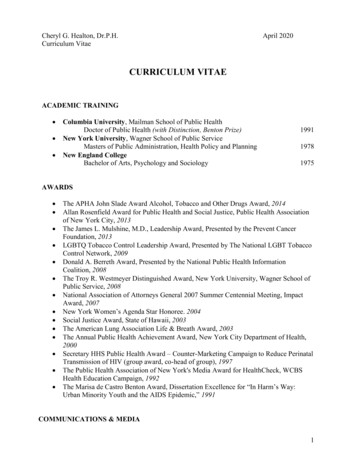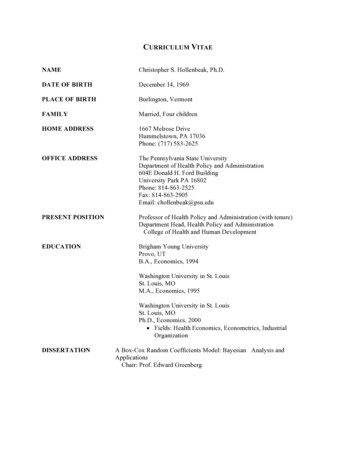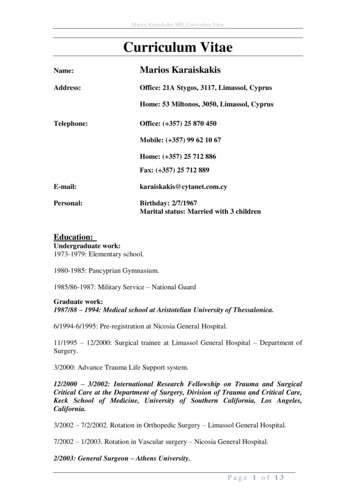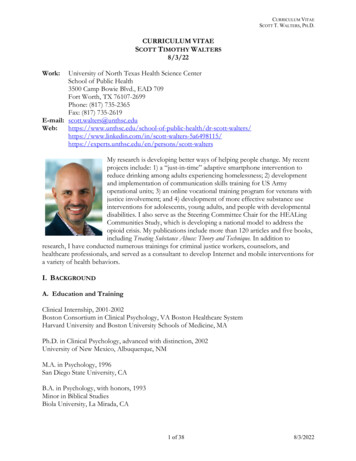
Transcription
CURRICULUM VITAESCOTT T. WALTERS, PH.D.CURRICULUM VITAESCOTT TIMOTHY WALTERS8/3/22Work:University of North Texas Health Science CenterSchool of Public Health3500 Camp Bowie Blvd., EAD 709Fort Worth, TX 76107-2699Phone: (817) 735-2365Fax: (817) 735-2619E-mail: //experts.unthsc.edu/en/persons/scott-waltersMy research is developing better ways of helping people change. My recentprojects include: 1) a “just-in-time” adaptive smartphone intervention toreduce drinking among adults experiencing homelessness; 2) developmentand implementation of communication skills training for US Armyoperational units; 3) an online vocational training program for veterans withjustice involvement; and 4) development of more effective substance useinterventions for adolescents, young adults, and people with developmentaldisabilities. I also serve as the Steering Committee Chair for the HEALingCommunities Study, which is developing a national model to address theopioid crisis. My publications include more than 120 articles and five books,including Treating Substance Abuse: Theory and Technique. In addition toresearch, I have conducted numerous trainings for criminal justice workers, counselors, andhealthcare professionals, and served as a consultant to develop Internet and mobile interventions fora variety of health behaviors.I. BACKGROUNDA. Education and TrainingClinical Internship, 2001-2002Boston Consortium in Clinical Psychology, VA Boston Healthcare SystemHarvard University and Boston University Schools of Medicine, MAPh.D. in Clinical Psychology, advanced with distinction, 2002University of New Mexico, Albuquerque, NMM.A. in Psychology, 1996San Diego State University, CAB.A. in Psychology, with honors, 1993Minor in Biblical StudiesBiola University, La Mirada, CA1 of 388/3/2022
CURRICULUM VITAESCOTT T. WALTERS, PH.D.B. Current PositionRegents Professor, Health Behavior and Health SystemsUniversity of North Texas Health Science Center, Ft. Worth TX9/18-presentC. Previous PositionsDepartment Chair, Health Behavior and Health SystemsProfessor, Health Behavior and Health SystemsUniversity of North Texas Health Science Center, Ft. Worth TX1/17-9/197/11-8/18Associate Professor, Health Promotion and Behavioral SciencesAssistant Professor, Health Promotion and Behavioral SciencesUniversity of Texas School of Public Health, Dallas, TX9/08-7/119/02-8/08Clinical Psychology Internship, VA Boston Healthcare SystemHarvard University and Boston University Schools of Medicine, Boston, MA9/01-8/02Instructor, Department of PsychologyUniversity of New Mexico, Albuquerque, NM8/98-5/01Teaching Associate, Department of PsychologySan Diego State University, San Diego, CA8/94-8/96Instructor, College of Extended StudiesGrossmont College, El Cajon, CA(Summers) 6/93-8/99D. Honors and AwardsSenior Consortium Research Fellowship, U.S. Army Research Institute, 2019-2022Academic Commendation of Excellence, UNTHSC, 2018Outstanding Faculty in Teaching, UNTHSC Public Health Student Association, 2013Faculty Research Excellence Award, UNTHSC School of Public Health, 2012Dean’s Teaching Excellence Award, UT School of Public Health, 2008, 2011University of Cincinnati Award in Corrections, American Probation & Parole Association, 2006Outstanding Young Investigator, UT Health Science Center at Houston, 2006Benjamin Haught Award for Research Excellence, UNM Department of Psychology, 2002David Pilon Training Scholarship, American Psychological Association, 2001Certificate of Merit in Public Service, American Psychological Association Division 18, 2000New Investigator Award, International Conference on Treatment of Addictive Behaviors, 2000Outstanding Graduate Researcher, Sigma Xi Scientific Research Society, UNM Chapter, 2000Summer Fellowship at the University of Notre Dame, Pew Younger Scholars Program, 2000Garland Award for Research on Adolescent Issues, UNM Department of Psychology, 1999Outstanding Teaching Associate, UNM Department of Psychology, 1999Regents Endowed Fellowship, UNM, 1999National Research Service Award, National Institutes of Health, 1997-2001Distinguished Student in Psychology, Rosemead School of Psychology, CA, 1993Dean's List of Distinguished Students, Biola University, CA, 1992-932 of 388/3/2022
CURRICULUM VITAESCOTT T. WALTERS, PH.D.II. RESEARCHA. Journal Articles1. Mun, E. Y., Zhou, Z., Huh, D., Tan, L., Li, D., Tanner-Smith, E. E., Walters, S. T., &Larimer, M. E. (in press). Brief alcohol interventions are effective through six months:findings from marginalized zero-inflated Poisson and negative binomial models in a two-stepIPD meta-analysis. Prevention Science.2. Walters, S. T. (in press). Working with clients who use and abuse substances: Practiceguidelines for community corrections officers. Federal Probation.3. Walters, S. T., Mun, E. Y., Tan, Z., Luningham, J. M., Hébert, E. T., Oliver, J. A., &Businelle, M. S. (in press). Development and preliminary effectiveness of a smartphonebased just-in-time adaptive intervention for adults with alcohol misuse who are experiencinghomelessness. Alcoholism: Clinical and Experimental Research.4. Baldry, E., Redlinger-Grosse, K., MacFarlane, I., Walters, S. T., Ash, E., Steinberger, J.,Murdy, K., Cragun, D., Allen-Tice, C., & Zierhut, H. A. (2022). Outcomes from a pilotgenetic counseling intervention using motivational interviewing and the extended parallelprocess model to increase cascade cholesterol screening. Journal of Genetic Counseling, 31, 164175. †5. Huh, D., Li, X., Zhou, Z., Walters, S. T., Baldwin, S. A., Tan, Z., Larimer, M. E., & Mun,E-Y. (2022). A structural equation modeling approach to meta-analytic mediation analysisusing individual participant data: testing protective behavioral strategies as a mediator ofbrief motivational intervention effects on alcohol-related problems. Prevention Science, 23, 390402.6. Mun, E-Y., Li, X., Lineberry, S., Tan, Z., Huh, D., Walters, S. T., Zhou, Z., & Larimer, M.E. (2022). Do brief motivational interventions reduce driving after drinking among collegestudents? A two-step meta-analysis of individual participant data. Alcohol and Alcoholism, 57,125-135.7. Winchester, B., Cragun, D., Redlinger-Grosse, K., Walters, S. T., Ash, E., Baldry, E., &Zierhut, H. (2022). Application of motivational interviewing strategies with the extendedparallel process model to improve risk communication for parents of children with familialhypercholesterolemia. Journal of Genetic Counseling. https://doi.org/10.1002/jgc4.15548. Holmes, E. J., Aryal, S., & Walters, S. T. (2021). What lifestyle factors predict depressivesymptoms? A longitudinal assessment among permanent supportive housing residents.Journal of Public Health: From Theory to Practice. https://doi.org/10.1007/s10389-021-01555-5 †9. Mun, E-Y., Li, X., Businelle, M. S., Hebert, E. T., Tan, Z., Barnett, N. P., & Walters, S. T.(2021). Ecological momentary assessment of alcohol consumption and its concordance withtransdermal alcohol detection and timeline follow-back self-report among adultsexperiencing homelessness. Alcoholism: Clinical and Experimental Research, 45, 864-76.10. Tafrate, R. C., Mitchell, D., Mackey, B. J., Appleton, C. E., Walters, S. T., Lee, J., &Taxman, F. S. (2021). Surfing the three waves of CBT in community supervision. FederalProbation, 85(3), 21-26.11. Tan, Z., Mun, E-Y., Nguyen, U-S., & Walters, S. T. (2021). Increases in social support cooccur with decreases in depressive symptoms and substance use problems among adults inpermanent supportive housing: an 18-month longitudinal study. BMC Psychology, 9(1), 6. †12. Vernon, S. W., del Junco, D. J., Coan, S. P., Murphy, C. C., Walters, S. T., Friedman, R. H.,Bastain, L. A. Fisher, D. A., Lairson, D. R., & Meyers, R. E. (2021). A stepped randomizedtrial to promote colorectal cancer screening in a nationwide sample of U.S. veterans.Contemporary Clinical Trials, 105, 106392.3 of 388/3/2022
CURRICULUM VITAESCOTT T. WALTERS, PH.D.13. Walters, S. T., Businelle, M. S., Suchting, R., Li, X., Hebert, E. T., & Mun, E-Y. (2021).Using machine learning to identify predictors of imminent drinking and create tailoredmessages for at-risk drinkers experiencing homelessness. Journal of Substance Abuse Treatment,127, 108417.14. Walters, S. T., Chandler, R. K., Clarke, R., El-Bassel, N., Glasgow, L. M., Jackson, R. D.,Oga, E. A., Samet, J. H., Walsh, S. L. & Zarkin, G. (2021). Modifications to the HEALingCommunities Study in response to COVID-19 related disruptions [Letter to the editor]. Drugand Alcohol Dependence, 222, 108669.15. Businelle, M. S., Walters, S. T., Mun, E-Y., Kirchner, T. R., Hebert, E. T., & Li, X. (2020).Reducing drinking among people experiencing homelessness: protocol for the developmentand testing of a just-in-time adaptive intervention. JMIR Research Protocols, 9(4), e15610.16. Chandler, R. K., Clarke, T., & Walters, S. T. (Eds.). (2020). The HEALing CommunitiesStudy: An integrated approach to addressing opioid use [Special issue]. Drug and AlcoholDependence, 217.17. Grace J., Walters, S. T., Gallegos, I., Thompson, E. L., & Spence, E. (2020). Use of a healthadvocacy model for survivors of interpersonal violence. International Journal of EnvironmentalResearch and Public Health, 17(23), E8966.18. Li, X., Clarke, N., Kim, S-Y., Ray, A. E., Walters, S. T., & Mun, E-Y. (2020). Protectivebehavioral strategies are more helpful for avoiding alcohol-related problems for collegedrinkers who drink less. Journal of American College Health, 70(5), 1493-99.19. Ondersma, S. J., & Walters, S. T. (2020). A clinician’s guide to evaluating and developingeHealth interventions for mental health. Psychiatric Research and Clinical Practice, 2, 26–33.20. Rossheim, M.E., Lerch, J., Walters, S.T., Livingston, M.D., & Taxman, F. S. (2020).Supersized alcopop consumption associated with homelessness and gang membership.Alcoholism: Clinical and Experimental Research, 44, 2373-78.21. Sloas, L., Walters, S. T., & Taxman, F. S. (2020). Individual-level predictors of the workingrelationship between probation officers and probationers. The Prison Journal, 100, 709-25.22. The HEALing Communities Study Consortium. (2020). The HEALing (Helping to EndAddiction Long-term) Communities Study: protocol for a cluster randomized trial at thecommunity level to reduce opioid overdose deaths through implementation of an integratedset of evidence-based practices. Drug and Alcohol Dependence, 217, 108335.23. Huh, D., Mun, E-Y., Walters, S. T., Zhou, Z., & Atkins, D. C. (2019). A tutorial onindividual participant data meta-analysis using Bayesian multilevel modeling to estimatealcohol intervention effects across heterogeneous studies. Addictive Behaviors, 94, 162-70. Data and R code at https://data.mendeley.com/datasets/4dw4kn97fz/224. Kruger, V., Redlinger-Grosse, K., Walters, S. T., Ash, E., McCarthy-Veach, P., & Zierhut,H. A. (2019). Development of a motivational interviewing genetic counseling intervention toincrease cascade cholesterol screening in families of children with familialhypercholesterolemia. Journal of Genetic Counseling, 28(5), 1059-64.25. Nandy, R. R., Nandy, K., Hebert, E. T., Businelle, M. S., & Walters, S. T. (2019).Identifying behaviors predicting early morning emotions by observing permanent supportivehousing residents: an ecological momentary assessment. JMIR Mental Health, 6(2), e10186.26. Rendon, A., Mun, E-Y., Spence-Almaguer, E., & Walters, S. T. (2019). What happens toagreement over time? A longitudinal study of self-reported substance use compared to salivatoxicological testing among subsidized housing residents. Journal of Substance Abuse Treatment,101, 12-17. †27. Spohr, S. A., Livingston, M., Taxman, F. S., & Walters, S. T. (2019). What’s the influence ofsocial interactions on substance use and treatment initiation? A prospective analysis amongsubstance-using probationers. Addictive Behaviors, 89, 143-50.4 of 388/3/2022
CURRICULUM VITAESCOTT T. WALTERS, PH.D.28. Cowell, A. J., Zarkin, G. A., Wedehase, B. J., Lerch, J., Walters, S. T., & Taxman, F. S.(2018). Cost and cost-effectiveness of computerized vs. in-person motivational interventionsin the criminal justice system. Journal of Substance Abuse Treatment, 87, 42-49.29. Garcia, E., Aryal, S., Spence-Almaguer, E., Rohr, D., & Walters, S. T. (2018). Use of theIRT model to validate test items from a technology assisted health coaching program. OpenJournal of Statistics, 8, 519-32. †30. Holmes, E. J., Yang, L., Aryal, S., & Walters, S. T. (2018). Influence of lifestyle behaviorsand social support on depressive symptoms. Health Behavior and Policy Review, 5(5), 28-36. †31. Kinney, A. Y., Howell, R., Ruckman, R., McDougall, J. A., Boyce, T. W., Vicuna, B., Lee, JH., Guest, D. D., Rycroft, R., Valverde, P. A., Gallegos, K. M., Meisner, A., Wiggins, C. L.,Atroup, A., Paddock, L. E., & Walters, S. T. (2018). Promoting guideline-based cancergenetic risk assessment for hereditary breast and ovarian cancer in ethnically andgeographically diverse cancer survivors: rationale and design of a 3-arm randomizedcontrolled trial. Contemporary Clinical Trials, 73, 123-35.32. Reingle Gonzales, J., Jetelina, K. K., Roberts, M., Reitzel, L. R., Kendzor, D., Walters, S. T.,& Businelle, M. (2018). Criminal justice system involvement among homeless adults.American Journal of Criminal Justice, 43(2), 158-66.33. Reingle Gonzalez, J., Walters, S. T., Taxman, F. S., Lerch, J. (2018). Gender differences insubstance use treatment and substance use among adults on probation. American Journal ofDrug and Alcohol Abuse, 44, 480-87.34. Rodriguez, M., Walters, S. T., Houck, J., Ortiz, J. A., & Taxman, F. S. (2018). The languageof change among criminal justice clients: counselor language, client language, and clientsubstance use outcomes. Journal of Clinical Psychology, 74(4), 626-36.35. Rossheim, M. E., Livingston, M. D., Lerch, J., Taxman, F. S., & Walters, S. T. (2018).Serious mental illness and negative substance use consequences among adults on probation.Health & Justice, 6(1), 1-9. [PMCID: PMC5864578]36. Walters, S. T. (2018). Treating substance use in mandated clients: What treatments have thebest evidence? Texas Probation Journal, 6(1), 6-8.37. Rossheim, M. E., Stephenson, C. J., Thombs, D. L., Livingston, M. D., Walters, S. T.,Suzuki, S., Barry, A. E., & Weiler, R. M. (2017). Characteristics of drinking events associatedwith heavy episodic drinking among adolescents in the United States. Drug and AlcoholDependence, 181, 50-57.38. Brumbach, B. H., Birmingham, W. C., Boonyasiriwat, W., Walters, S. T., & Kinney, A. Y.(2017). Intervention mediators in a randomized controlled trial to increase colonoscopyuptake among individuals at increased risk of familial colorectal cancer. Annals of BehavioralMedicine, 51(5), 694-706.39. Lerch, J., Walters, S. T., Tang, L., & Taxman, F. S. (2017). Effectiveness of a computerizedmotivational intervention on treatment initiation and substance use: results from arandomized trial. Journal of Substance Abuse Treatment, 80, 59-66. [PMCID: PMC5564468] †40. Marshall, B., Spohr, S., A., Taxman, F. S., & Walters, S. T. (2017). The effect of childhoodhousehold dysfunction on future HIV risk among probationers. Journal of Health Care for thePoor and Underserved, 28, 754-69. †41. Rendon, A., Livingston, M., Suzuki, S., Hill, W., & Walters, S. T. (2017). What's theagreement between self-reported and biochemical verification of drug use? A look atpermanent supportive housing residents. Addictive Behaviors, 70, 90-96. †42. Rossheim, M. E., Barry, A. E., Thombs, D. L., Weiler, R. M., Krall, J. R. Stephenson, C.,Walters, S. T., Reed, M. B., Clapp, J. D., Suzuki, S., Barnett, T. E., & Cannell, B. (2017).Factors associated with self-estimated breath alcohol concentration among bar patrons.Alcoholism: Clinical and Experimental Research, 41(8), 1492-1501.5 of 388/3/2022
CURRICULUM VITAESCOTT T. WALTERS, PH.D.43. Spohr, S. A., Walters, S. T., & Taxman, F. S. (2017). People’s reasons for wanting tocomplete probation: Use and predictive validity in an e-health intervention. Evaluation andProgram Planning, 61, 144-49. †44. Rinker, D., Diamond, P. M., Walters, S. T., Wyatt, T. M., & Dejong, W. (2016). Distinctclasses of negative alcohol-related consequences in a national sample of incoming first-yearcollege students: A latent class analysis. Alcohol and Alcoholism, 51(5) 602-608.45. Rossheim, M. E., Thombs, D. L., Weiler, R. M., Barry, A. E., Suzuki, S., Walters, S. T.,Barnett, T. E., Paxton, R., Pealer, L. N., & Cannell, B. (2016). Alcohol mixed with energydrink: use may be a consequence of heavy drinking. Addictive Behaviors, 57, 55-61. †46. Spohr, S. A., Suzuki, S., Marshall, B., Taxman, F. S., & Walters, S. T. (2016). Social supportquality and availability affects risk behaviors in offenders. Health & Justice, 4(2). †47. Spohr, S. A., Taxman, F. S., Rodriguez, M., & Walters, S. T. (2016). Motivationalinterviewing fidelity in a criminal justice setting: Treatment initiation and subsequent druguse. Journal of Substance Abuse Treatment, 65, 20-5. [PMCID: PMC4732927] †48. Birmingham, W. C., Hung, M., Boonyasiriwat, W., Kohlmann, W., Walters, S. T., Burt, R.W., Stroup, A. M., Edwards, S. L., Schwarz, M. D., Lowery, J. T., Hill, D. A., Wiggins, C. L.,Higginbotham, J. C., Tang, P., Hon, S. D., Vernon, S. W., & Kinney, A. Y. (2015).Effectiveness of the extended parallel process model in promoting colorectal cancerscreening. Psycho-Oncology, 24, 1265-78.49. Chartier, K. G., Carmody, T., Akhtar, M., Stebbins, M. B., Walters, S. T., & Warden, D.(2015). Hispanic subgroups, cultural attributes, and substance abuse treatment outcomes.Journal of Substance Abuse Treatment, 59, 74-82.50. Mun, E-Y., Atkins, D. C., & Walters, S. T. (2015). Is motivational interviewing effective atreducing alcohol misuse in young adults? A critical review of Foxcroft et al. (2014). Psychologyof Addictive Behaviors, 29(4), 836-46. [PMCID: PMC4701621]51. Mun, E-Y., de la Torre, J., Atkins, D. C., White, H. R., Ray, A. E., Kim, S-Y., Jiao, Y.,Clarke, N., Huo, Y., Larimer, M. E., Huh, D., & Project INTEGRATE Team. (2015).Project INTEGRATE: An integrative study of brief alcohol interventions for collegestudents. Psychology of Addictive Behaviors, 29, 34-48. [PMCID: PMC4388772]52. Neff, J. A., Kelley, M. L., Walters, S. T., Cunningham, T. D., Paulson, J. F., Braitman, A. L.,Brickhouse, T. H., Gunsolley, J., Darby, M., Lemaster, M., Vandersluis, J. P., Walsh, M., &Bolen, H. (2015). Effectiveness of a brief screening and intervention protocol for heavydrinkers in dental practice. Journal of Health Psychology, 20(12), 1534-48.53. Reingle Gonzalez, J. M., Walters, S. T., Lerch, J Taxman, F. S. (2015). The relationshipbetween drug use, drug-related arrests, and chronic pain among adults onprobation. Journal of Substance Abuse Treatment, 53, 33-8. [PMCID: PMC4414689]54. Rinker, D., Walters, S. T., Wyatt, T. M., & Dejong, W. (2015). Do incoming first-yearcollege students who think of themselves as adults drink more responsibly after startingcollege? Emerging Adulthood, 3(5), 359-63. †55. Rossheim, M. E., Weiler, R. M., Barnett, T. E., Suzuki, S., Walters, S. T., Barry, A. E.,Cannell, B., Pealer, L. N., Moorhouse, M. D., Zhang, Q., & Thombs, D. L. (2015). Selfefficacy to drive while intoxicated: Insights into the persistence of alcohol-impaired driving.Alcoholism: Clinical and Experimental Research, 39(8), 1547-54. †56. Smith, D. C., Ureche, D. J., Davis, J. P., & Walters, S. T. (2015). Motivational interviewingwith and without normative feedback for adolescents with substance use problems: Apreliminary study. Substance Abuse, 36, 350-58. [PMCID: PMC4490139]57. Spohr, S. A., Nandy, R., Gandhiraj, D., Anne, S., & Vemulapalli, A., & Walters, S. T.(2015). Efficacy of SMS text message interventions for smoking cessation: A meta-analysis.Journal of Substance Abuse Treatment, 56, 1-10. †6 of 388/3/2022
CURRICULUM VITAESCOTT T. WALTERS, PH.D.58. Spohr, S. A., Walters, S. T., & Taxman, F. S. (2015). The relationship between electronicgoal reminders and subsequent drug use and treatment initiation in a criminal justice setting.Addictive Behaviors, 51, 51-56. [PMCID: PMC4732927] †59. Steffen, L. E., Boucher, K. M., Damron, B. H., Pappas, L. M., Walters, S. T., Flores, K. G.,Boonyasiriwat, W., Vernon, S. W., Stroup, A. M., Schwartz, M. D., Edwards, S. L.,Kohlmann, W. K., Lowery, J. T., Wiggins, C. L., Hill, D. A., Higginbotham, J. C., Burt, R.,Simmons, R. G., & Kinney, A. Y. (2015). Efficacy of a telehealth intervention oncolonoscopy uptake when cost is a barrier: The Family CARE cluster randomized controlledtrial. Cancer Epidemiology, Biomarkers, & Prevention, 24(9), 1311-18. [PMCID: PMC4734378] †60. Taxman, F. S., Walters, S. T., Sloas, L. B., Lerch, J., & Rodriguez, M. (2015). Motivationaltools to improve probationer treatment outcomes. Contemporary Clinical Trials, 43, 120-28.[PMCID: PMC4522391]61. Walters, S. T., Spence-Almaguer, E., Hill, W., & Abraham, S. (2015). Health coaching andtechnology with vulnerable clients. Social Work Today, 15(5) 6-7.62. Campbell, A. N. C., Nunes, E. V., Matthews, A. G., Stitzer, M., Miele, G. M., Polsky, D.,Turrigiano, E., Walters, S. T., McClure, E. A., Wahle, A., Van Veldhuisen, P., Goldman, B.,Babcock, D., Stabile, P. Q., Winhusen, T., & Ghitza, U. E. (2014). Internet-deliveredtreatment for substance abuse: A multisite randomized controlled trial. American Journal ofPsychiatry, 171, 683-90. [PMCID: PMC4079279]63. Field, C. A., Walters, S. T., Marti, C. N., Jun, J., Foreman, M., & Brown, C. (2014). Amultisite randomized controlled trial of brief intervention to reduce drinking in the traumacare setting: How brief is brief? Annals of Surgery, 259(5), 873-80. [PMCID:PMC3984362]64. Kinney, A. Y., Boonyasiriwat, W. P., Walters, S. T., Stroup, A. M., Schwartz, M. D., Pappas,L. M., Edwards, S. L., Rogers, A., Kohlmann, W. K., Boucher, K. M., Burt, R. W., Vernon,S. W., Simmons, R. G., Lowery, J. T., Wiggins, C. L., Williams, M. S., Hill, D. A., &Higginbotham, J. C. (2014). Telehealth personalized cancer risk communication to motivatecolonoscopy in relatives of colorectal cancer patients: The Family CARE randomizedcontrolled trial. Journal of Clinical Oncology, 32(7), 654-62. [PMCID: PMC3927734]65. Ray, A. E., Kim, S-Y., White, H. R., Larimer, M. E., Mun, E. Y., Clarke, N., Jiao, Y., Atkins,D. C., Huh, D., & The Project INTEGRATE Team. (2014). When less is more and moreis less in brief motivational interventions: Characteristics of intervention content and theirassociations with drinking outcomes. Psychology of Addictive Behaviors, 28(4), 1026-40. [PMCID:PMC4237686]66. Rossheim, M. E., Wilson, F., Suzuki, S., Rodriguez, M., Walters, S. T., & Thombs, D. L.(2014). Associations between drug use and motorcycle helmet use in fatal crashes. TrafficInjury Prevention, 15(7), 678-684. †67. Simmons, R. G., Walters, S. T., Pappas, L., Boucher, K. M., Boonyasiriwat, W. P.,Gammond, A., Vernon, S. W., Burt, R. W., Stroup, A. M., & Kinney, A. Y. (2014).Implementation of treatment fidelity in the Family Colorectal Cancer Awareness and RiskEducation randomized controlled trial. SAGE Open, 2014, 1-13. †68. Walters, S. T., Ondersma, S. J., Ingersoll, K. S., Rodriguez, M., Lerch, J., Rossheim, M. E.,& Taxman, F. S. (2014). MAPIT: Development of a web-based intervention targetingsubstance abuse treatment in the criminal justice system. Journal of Substance Abuse Treatment,46, 60-65. [PMCID: PMC3818291]69. Abraham, S., Vasquez, M., Denton, D., Walters, S. T., & Miele, G. M. (2013, July/August).The Therapeutic Education System: Client and staff experiences of participating in arandomized trial of an online drug education system. Counselor: The Magazine for AddictionsProfessionals, 2013(4), 44-47.7 of 388/3/2022
CURRICULUM VITAESCOTT T. WALTERS, PH.D.70. Leahy, M. M., Jouriles, E. N., & Walters, S. T. (2013). An examination of college students’receptiveness to alcohol-related information and advice: A psychometric evaluation. Journal ofCollege Student Development, 54, 649-653. †71. Miller, M. B., Leffingwell, T., Claborn, K., Meier, E., Walters, S. T., & Neighbors, C. (2013).Personalized feedback interventions for college alcohol misuse: An update of Walters &Neighbors (2005). Psychology of Addictive Behaviors, 27(4), 909-20. †72. Neff, J. A., Walters, S. T., Braitman, A. L., Kelley, M. L., Paulson, J. F., Brickhouse, T.,Gunsolley, J., Darby, M., Lemaster, M., & Vandersluis, J. P. (2013). A brief motivationalintervention for heavy alcohol use in dental practice settings: Rationale and development.Journal of Health Psychology, 18(4), 542-553. [PMCID: PMC3522753]73. Nguyen, N., Walters, S. T., Wyatt, T. M., & DeJong, W. (2013). Do college drinkers learnfrom their mistakes? Effects of recent alcohol-related negative consequences on plannedprotective drinking strategies among college freshmen. Substance Use and Misuse, 48(14), 146368.74. Simmons, R. G., Lee, Y. C., Stroup A. M., Edwards, S. L., Rogers, A., Johnson, C., Wiggins,C. L., Hill, D. A., Cress, R. D., Lowery, J., Walters, S. T., Jasperson, K., Higgenbotham, J.C., Williams, M. S., Burt, R., Schwartz, M., & Kinney, A.Y. (2013). Examining the challengesof family recruitment to behavioral intervention trials: Factors associated with participationand enrollment in a multi-state colonoscopy intervention trial. Trials, 14(116). [PMCID:PMC3691526] †75. Walters, S. T., Ressler, E., Douglas, L., & Taxman, F. S. (2013, October). Motivationalinterviewing in criminal justice: A new approach to addressing treatment motivation andrelated behaviors. Counselor: The Magazine for Addictions Professionals, 2013(5), 48-53.76. Halterman, S. L., Rodin, A. S., & Walters, S. T. (2012). The Open Door Mission: Measuringand predicting outcomes of one community-based substance abuse treatment program.Alcoholism Treatment Quarterly, 30(1), 22-39. †77. Walters, S. T., Cornett, M., & Vader, A. M. (2012). Coding motivational interviewing incriminal justice interactions: Recommendations for research and practice. MotivationalInterviewing: Training, Research Implementation, & Practice, 1(1), 25-30. †78. Nguyen, N., Walters, S. T., Rinker, D. V., Wyatt, T. M., & DeJong, W. (2011). Fake IDownership in a U.S. sample of incoming first-year college students. Addictive Behaviors, 36(7),759-761.79. Nguyen, N., Walters, S. T., Wyatt, T. M., & DeJong, W. (2011). Use and correlates ofprotective drinking behaviors during the transition to college: Analysis of a national sample.Addictive Behaviors, 36(10), 1008-1014.80. Pengchit, W., Walters, S. T., Simmons, R. G., Kohlmann, W., Burt, R. W., Schwartz, M. D.,& Kinney, A. Y. (2011). Motivation-based intervention to promote colonoscopy screening:An integration of the Extended Parallel Process Model and motivational interviewing. Journalof Health Psychology, 16(8), 1187-1197. [PMCID: PMC3162074] †81. Shetty, D., Verma, M., Shetty, S., Dubey, S., Walters, S. T., Berstein, I., Froelich-Grobe, K.,& Puttaiah, R. (2011). Knowledge, attitudes and practice of dental infectioncontrol and occupational safety in India: 1999 and 2010. World Journal of Dentistry, 2(1), 1-9. †82. Vader, A. M., Walters, S. T., Roudsari, B., & Nguyen, N. D. (2011). Where do collegestudents get health information? Believability and usefulness of health information sources.Health Promotion Practice, 12(5), 713-722. †83. Walters, S. T., & Neighbors, C. (2011). College alcohol prevention: A view of present (andfuture) web-based approaches. Alcohol Research & Health, 34(2), 222-224. [PMCID:PMC3860575].8 of 388/3/2022
CURRICULUM VITAESCOTT T. WALTERS, PH.D.84. Lopez, W.D., Krueger, P.M., & Walters, S. T. (2010). High-risk drug use and sexualbehaviors among out-of-treatment drug users: An aging and life course perspective. AddictiveBehaviors, 35(5), 432-7. †85. Jouriles, E. N., Brown, A. S., Rosenfield, D., McDonald, R., Croft, K., Leahy, M. M., &Walters, S. T. (2010). Improving the effectiveness of computerized drinking feedbackinterventions for college students. Psychology of Addictive Behaviors, 24(4), 592-599.86. Vader, A. M., Walters, S. T., Prabhu, G. C., Houck, J. M., & Field, C. A. (2010). Thelanguage of motivational interviewing and feedback: Counselor language, client language,and client drinking outcomes. Psychology of Addictive Behaviors, 24(2), 190-197. [PMCID:PMC2891547] †87. Walters, S. T. (2010). If the drinking age were lowered, what then? A view from the year2020. Journal of American College Health, 58(6), 597-581.88. Walters, S. T., Vader, A. M., Nguyen, N. D., Harris, T. R., & Eells, J. (2010). Motivationalinterviewing as a supervision strategy in probation: A randomized effectiveness trial. Journalof Offender Rehabilitation, 49(5), 309-323.89. Roudsari, B., Leahy, M. M., Walters, S. T. (2009). Correlates of dating violence amongheavy drinking college students. Journal of Interpersonal Violence, 24(11), 1892-1905.90. Vader, A. M., Walters, S. T., Harris, T. R., & Hoelscher, D. (2009). Television viewing andsnacking behaviors in Texas schoolchildren. Preventing Chronic Disease: Public Health Research,Practice and Policy, 6(3), 1-10. [PMCID: PMC2722406] †91. Walters, S. T., Vader, A. M., Harris, T. R., Field, C. A., & Jouriles, E. N. (2009).Dismantling motivational interviewing and feedback for college drinkers: A randomizedclinical trial. Journal of Consulting and Clinical Psychology, 77(1), 64-73. [PMCID: PMC2704891]92. Walters, S. T., Vader, A. M., Harris, T. R., & Jouriles, E. N. (2009). Reactivity to alcoholassessment measures: An experimental test. Addiction, 104(8), 1305-10. [PMCID:PMC2724752]93. Alexander, M. A., VanBenschoten, S. W., Walters, S. T. (2008). Motivational interviewingtraining in criminal justice: Development of a model plan. Federal Probation, 72(2),
Ph.D. in Clinical Psychology, advanced with distinction, 2002 University of New Mexico, Albuquerque, NM M.A. in Psychology, 1996 San Diego State University, CA B.A. in Psychology, with honors, 1993 Minor in Biblical Studies Biola University, La Mirada, CA . CURRICULUM VITAE SCOTT T. WALTERS, PH.D. 2 of 38 8/3/2022
